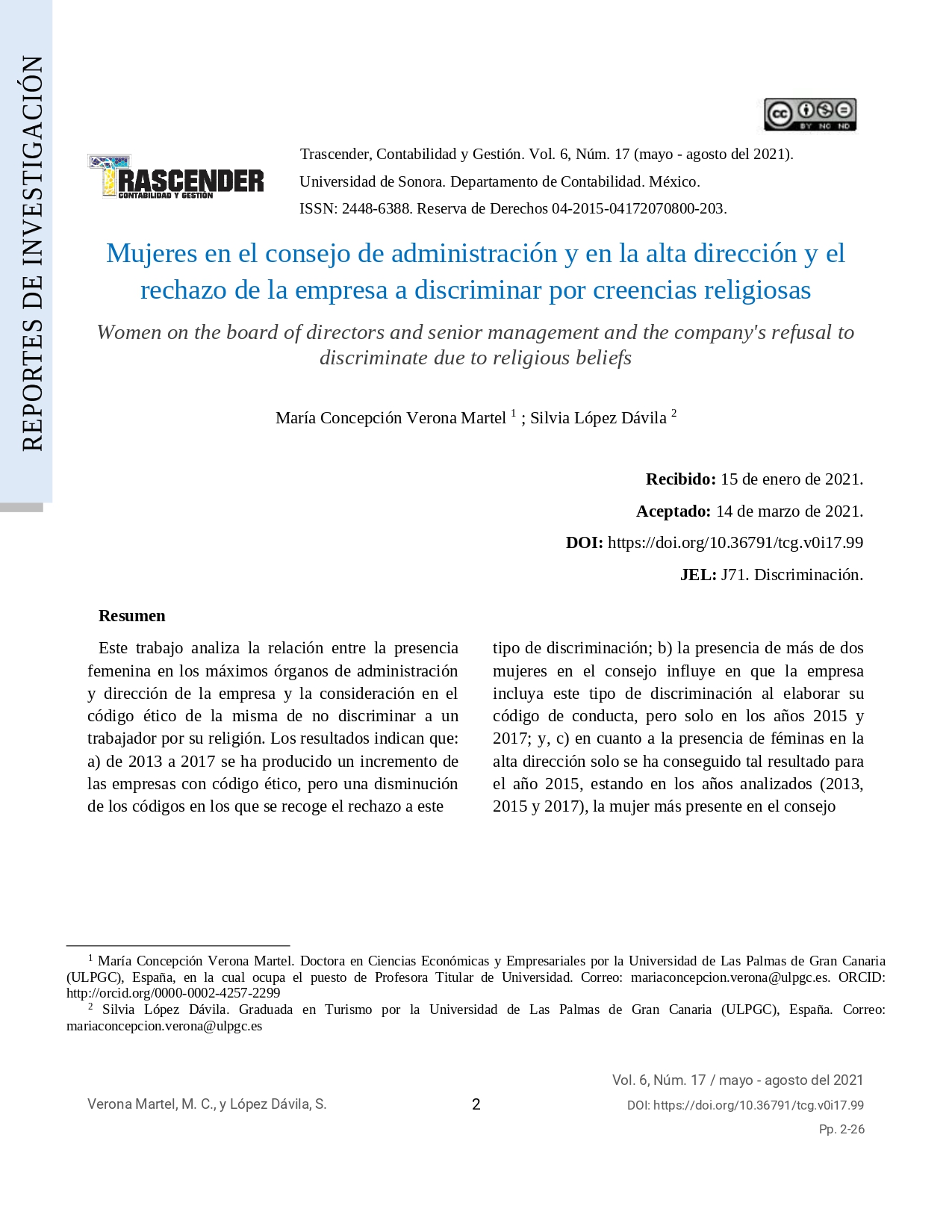Women on the board of directors and senior management and the company's refusal to discriminate due to religious beliefs
DOI:
https://doi.org/10.36791/tcg.v0i17.99Keywords:
Discrimination, Religion, Women, Management, DirectorsAbstract
The aim of this paper is to analyze the relationship between the female presence in the highest administrative and management bodies of the company and the including in its ethical code of not discriminating against workers because of their religion. The results indicate that: a) from 2013 to 2017 there has been an increase in companies with an ethical code, but a decrease in the codes in which the rejection of this kind of discrimination is stated; b) the presence of more than two women on the board of directors influences the
company decision to include this form of discrimination when its code of conduct is designed, but only in 2015 and 2017; and, c) regarding the presence of women in senior management, this result has only been achieved for 2015, highlighting that there are more women on the board than in senior management during the years studied (2013, 2015 and 2017).
Downloads
References
Ali, S. R., Yamada, T., y Mahmood, A. (2015). Relationships of the practice of hijab, workplace
discrimination, social class, job stress, and job satisfaction among Muslim American women. Journal of Employment Counseling, 52(4), 146-157.
Adams, R. B., y Funk, P. (2012). Beyond the Glass Ceiling: Does Gender Matter? Management Science, 58(2), 219-235. DOI: https://doi.org/10.1287/mnsc.1110.1452
Arredondo Trapero, F. G., De la Garza García, J., y Villa Castaño, L. E. (2014). Propuesta para el diseño de un código de ética empresarial basado en la ética kantiana. Cuadernos de Administración, 30(52), 9-19. DOI: https://doi.org/10.25100/cdea.v30i52.26
Beu, D. S., Buckley, M. R., y Harvey, M. G. (2003). Ethical decision–making: A multidimensional construct. Business Ethics: A European Review, 12(1), 88-107. DOI: https://doi.org/10.1111/1467-8608.00308
Cantone, J. A., y Wiener, R. L. (2017). Religion at work: Evaluating hostile work environment religious discrimination claims. Psychology, Public Policy, and Law, 23(3), 351-366. DOI: https://doi.org/10.1037/law0000132
Centro de Investigaciones Sociológicas. (2016). Percepción de la discriminación en España (II). Estudio nº 3150.
Comisión Nacional del Mercado de Valores. (2020). Código de buen gobierno de las sociedades cotizadas. España.
Comisión Europea. (2019). Special Eurobarometer 493: Discrimination in the European Union. Unión Europea.
Constitución Española. (1978). BOE núm. 311, de 29 de diciembre de 1978. España.
García-Marzá, D. (2014). La RSC en perspectiva ética. Mediterráneo económico, (26), 239-254. DOI: https://doi.org/10.6035/Sapientia84
Ghumman, S., Ryan, A. M., Barclay, L. A., y Markel, K. S. (2013). Religious discrimination in the workplace: a review and examination of current and future trends. Journal of Business and Psychology, 28(4), 439-454. DOI: https://doi.org/10.1007/s10869-013-9290-0
Héliot, Y., Gleibs, I. H., Coyle, A., y Rousseau, D. M. (2020). Religious identity in the workplace: A systematic review, research agenda, and practical implications. Human Resource Management, 59, 153-173. DOI: https://doi.org/10.1002/hrm.21983
Konrad, A. M., Kramer, V., y Erkut, S. (2008). The impact of three or more women on corporate boards. Organizational Dynamics, 37(2), 145-162. DOI: https://doi.org/10.1016/j.orgdyn.2008.02.005
King, E. B., y Ahmad, A. S. (2010). An experimental field study of interpersonal discrimination toward Muslim job applicants. Personnel Psychology, 63, 881-906. DOI: https://doi.org/10.1111/j.1744-6570.2010.01199.x
Ley Orgánica 3/2007, de 22 de marzo, para la igualdad efectiva de mujeres y hombres. BOE núm. 71, de 23 de marzo de 2017. España.
Mallin, C. A., y Michelon, G. (2011). Board reputation attributes and corporate social performance: an empirical investigation of the US best corporate citizens. Accounting and Business Research, 41(2), 119-144. DOI: https://doi.org/10.1080/00014788.2011.550740
Matsa, D. A., y Miller, A. R. (2013). A female style in corporate leadership? Evidence from quotas. American Economic Journal: Applied Economics, 5(3), 136-169. DOI: https://doi.org/10.1257/app.5.3.136
Messarra, L. C. (2014). Religious Diversity at Work: The perceptual effects of religious discrimination on employee engagement and commitment. Contemporary Management Research, 10(1), 59-80. DOI: https://doi.org/10.7903/cmr.12018
Nielsen, S., y Huse, M. (2010). The contribution of women on boards of directors: going beyond the surface. Corporate Governance: An International Review, 18(2), 136-148. DOI: https://doi.org/10.1111/j.1467-8683.2010.00784.x
Palumbo, R., y Manna, R. (2019). A portrait of workplace discrimination in Italy: empirical evidence from a nationwide survey. Evidence-based HRM: A Global Forum for Empirical Scholarship, 8(1), 92-112. DOI: https://doi.org/10.1108/EBHRM-03-2019-0029
Real Decreto Legislativo 2/2015, de 23 de octubre, por el que se aprueba el texto refundido de la Ley del Estatuto de los Trabajadores. BOE núm. 255, de 24 de octubre de 2015. España.
Ryan, A. M., y Gardner, D. M. (2019). Religious harassment and bullying in the workplace. En: D’Cruz, P., Noronha, E, Caponecchia, C., J. Escartín, J., Salin, D., y Tuckey, M.R. (Ed.), Dignity and Inclusion at Work, (pp. 1-25). Springer.
Stedham, Y., Yamamura, J. H., y Beekun, R. I. (2007). Gender differences in business ethics: justice and relativist perspectives. Business Ethics: A European Review, 16(2), 163-174. DOI: https://doi.org/10.1111/j.1467-8608.2007.00486.x
Tribunal Europeo de Derechos Humanos. (2010). Convenio Europeo de Derechos Humanos. 1 de junio de 2010.
Unión Europea. (2000). Directiva 2000/78/CE del Consejo, de 27 de noviembre de 2000, relativa al establecimiento de un margo general para la igualdad de trato en el empleo y la ocupación. Diario Oficial de las Comunidades Europeas, L 303, 2 de diciembre de 2000, pp. 16-22.
Valfort, M. A. (2015). Religious discrimination in access to employment: a reality. Institut Montaigne, Policy paper, octubre.
Verona Martel, M. C., Déniz Mayor, J. J., y Clavijo González, J. (2016). ¿La declaración de respeto al medio ambiente por parte de la empresa depende de la composición del consejo de administración en términos de género? Vértice Universitario, 18(69), 27-35.
Wallace, M., Wright, B. R. E., y Hyde, A. (2014). Religious affiliation and hiring discrimination in the American South: A field experiment. Social Currents, 1(2), 189-207. DOI: https://doi.org/10.1177/2329496514524541
Wright, B. R. E., Wallace, M., Bailey, J., y Hyde, A. (2013). Religious affiliation and hiring discrimination in New England: A field experiment. Research in Social Stratification and Mobility, 34, 111-126. DOI: https://doi.org/10.1016/j.rssm.2013.10.002

Downloads
Published
How to Cite
Issue
Section
License
Copyright (c) 2021 María Concepción Verona Martel, Silvia López Dávila

This work is licensed under a Creative Commons Attribution-NonCommercial-NoDerivatives 4.0 International License.
La Revista Trascender, Contabilidad y Gestión se compromete a asegurar la confidencialidad y privacidad dela información personal que se capture en éste sistema de conformidad con los lienamientos editoriales de la Universidad de Sonora
La información será utilizada únicamente para fines editoriales, académicos y de investigación, notificándose de forma directa al usuario registrado en el sistema, con el alcance que el usuario establezca al momento de su registro.
























